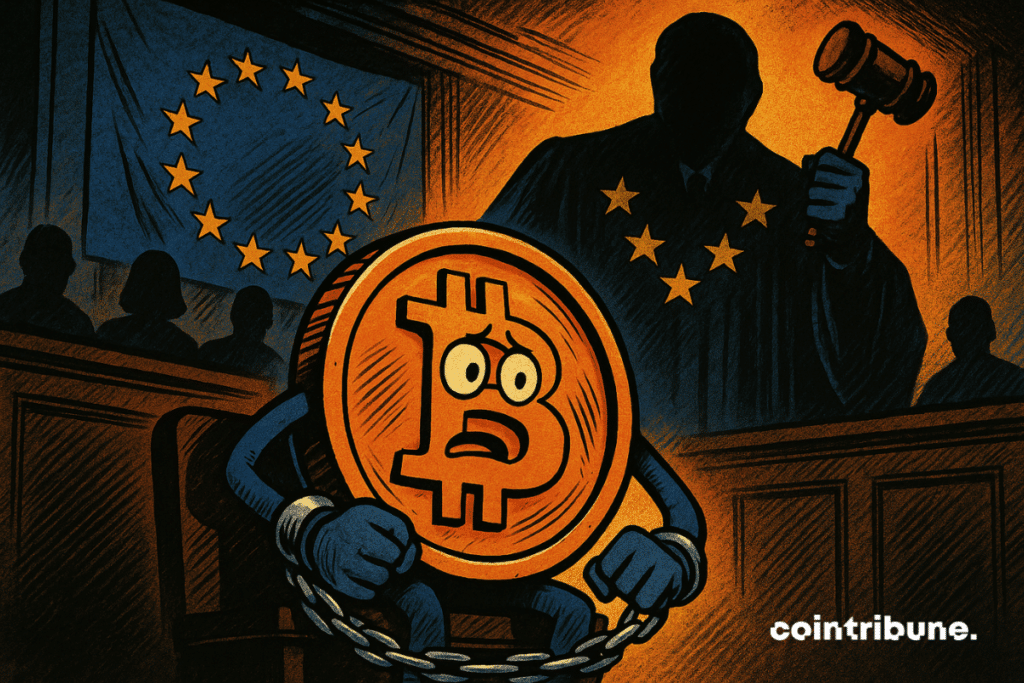Could Bitcoin Soon Be Banned In Europe?
The European Data Protection Board (EDPB) recently included the Bitcoin public key within the scope of the GDPR, turning every transaction into a legal issue. Without formally banning cryptocurrency, this approach creates a gray area that is difficult to navigate.

In Brief
- The European Data Protection Board equates Bitcoin public keys with personal data, subjecting every transaction to GDPR obligations.
- The impossibility of erasing data on the blockchain directly conflicts with the right to be forgotten required by the GDPR.
- Without legal adaptation, bitcoin could become illegal de facto in Europe, despite the absence of a formal ban.
An EDPB Decision with Feared Consequences for Bitcoin
The EDPB ruled that a public key is personal data if it can identify, even indirectly, a natural person. This definition subjects every Bitcoin address to data protection obligations. In practice, every transaction is constrained by European law.
Next, the committee asserts that technical impossibility cannot be invoked to justify non-compliance with the GDPR. Thus, Bitcoin’s immutability cannot excuse the absence of the right to erasure. The GDPR requires data deletion, but the chain does not offer it.
Finally, the guidelines hypothetically mention the need to erase data, even if it requires radical measures. Some commentators interpret this as the possibility, lacking a technical solution, of having to make bitcoin inaccessible or even consider its deletion.
This hypothesis illustrates the paradox between European legal requirements and the very nature of bitcoin.
Alexandre Stachtchenko’s Warning and the Risk of De Facto Ban
Alexandre Stachtchenko sounds the alarm. According to him:
If the European Data Protection Board’s guidelines are confirmed in their final version, there will no longer be any use of Bitcoin 100% compliant with European law.
For the expert, this situation is equivalent to a de facto ban on bitcoin, without prohibition, caused by regulatory collision. He points out the absurdity of a framework where technology (immutable blockchain) clashes with law (right to erasure).
Stachtchenko then details the practical constraints:
- The Bitcoin public key, qualified as personal data, traps the network within the GDPR.
- The impossibility of erasing blocks makes compliance with the right to be forgotten unattainable.
- Offering on-chain anonymization (mixers, zero-knowledge) clashes with anti-money laundering rules.
Under the Regulation on Financial Transfers (TFR 2023/1113), mixers and “privacy” wallets are considered high risk, with KYC required from €1,000. The AMLR (2024/1624) prohibits any solution promoting anonymity.
At the national level, the French law of March 20, 2025 presumes any anonymous transaction as money laundering.
This double injunction — comply with the GDPR or face anti-money laundering sanctions — traps the user in a deadlock. Without a legal way out, bitcoin risks becoming de facto illegal in Europe.
The EDPB public consultation remains open until June 9, 2025. It is crucial that Bitcoin ecosystem actors, Web3 companies, and policymakers actively participate in this consultation. Without legal framework adaptation, the very use of bitcoin — and more broadly public blockchains — could become incompatible with European law.
Maximize your Cointribune experience with our "Read to Earn" program! For every article you read, earn points and access exclusive rewards. Sign up now and start earning benefits.

Fascinated by Bitcoin since 2017, Evariste has continuously researched the subject. While his initial interest was in trading, he now actively seeks to understand all advances centered on cryptocurrencies. As an editor, he strives to consistently deliver high-quality work that reflects the state of the sector as a whole.
The views, thoughts, and opinions expressed in this article belong solely to the author, and should not be taken as investment advice. Do your own research before taking any investment decisions.